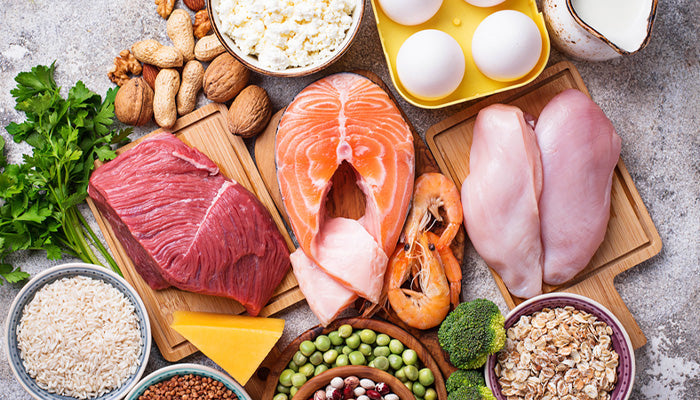Why is Protein Important in Your Diet?
Our body requires protein to work the way it should and stay healthy. Protein is an essential part of the thousands of processes in our body that carry oxygen throughout the body and fuel our energy.
Protein is essential for muscle growth, repair, immune function & overall health. It helps in tissue repair, hormone production, and maintaining a healthy body.
It also helps create antibodies that keep cells healthy and fights off illnesses and infections.
Let us dive more into why protein is important in our daily diet and also discover how protein helps us stay healthy and strong.
An essential macronutrient, Protein is made from more than 20 basic building blocks known as amino acids. Out of them, nine amino acids - leucine, lysine, methionine, phenylalanine, histidine, isoleucine, threonine, tryptophan, and valine - must come from food.
Significance Of Protein In Daily Diet
The human body does not store proteins. Therefore, it becomes essential for us to feed our bodies with sufficient proteins every day without fail. Daily intake of proteins plays a crucial role in keeping our cells, tissues, and organs in good shape.
- Proteins are important building blocks of muscles, skin, cartilage, and bones. Interestingly, our nails and hair are comprised primarily of proteins.
- The human body requires protein to build and repair tissue.
- A protein compound is carried by the red blood cells in the body. This compound is responsible for the transportation of oxygen throughout our body so that every part of the body receives the nutrients it requires.
- Approximately half of the dietary protein that we consume every day goes into creating enzymes that aid in digestion and making new body chemicals and cells.
- Protein plays a critical role in the regulation of body hormones, especially during the development and transformation of cells during puberty.
- Protein, along with carbohydrates, also helps us feel full longer which means we don't feel the constant urge to eat as often. Eventually, this helps in keeping body fat and weight down while the body is fueled with the right nutrients that it requires.
Benefits Of A Protein-Rich Diet
- Builds lean muscle
- Speeds recovery after exercise
- Reduces muscle mass
- Improves muscle mass, size, and definition
- Helps you maintain a healthy weight
- Curb hunger and helps you lose body fat
- Promotes balanced growth and maintenance of tissues
- Improves the quality of skin, hair, and nails
- Regulates the concentrations of acids and bases in blood and other bodily fluids
- Helps maintain fluid balance
- Assists in carrying substances throughout the bloodstream - into cells, out of cells, or within cells
Rich Sources Of Protein
Protein-rich sources include peas, beans, seeds, whole grains, chickpeas/garbanzo, edamame/soybeans, peanuts, almonds, pistachios, cashews, and walnuts.
Other sources include sunflower seeds, flax seeds, sesame seeds, chia seeds, walnuts, hazelnuts, pecans, hemp seeds, wheat, quinoa, rice, yogurt, wild rice, millet, oats, corn, broccoli, asparagus, brussels sprouts, and artichokes.


